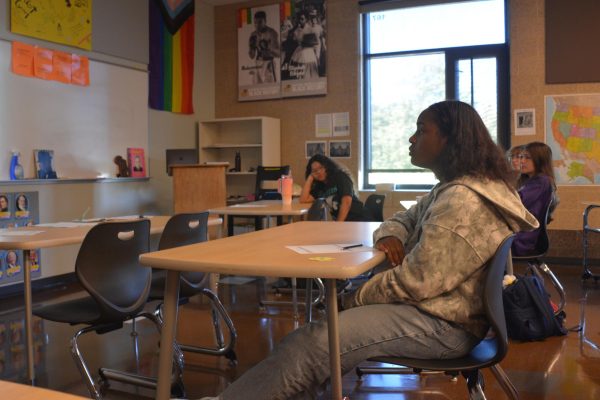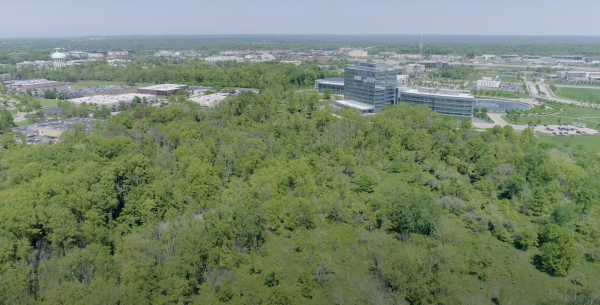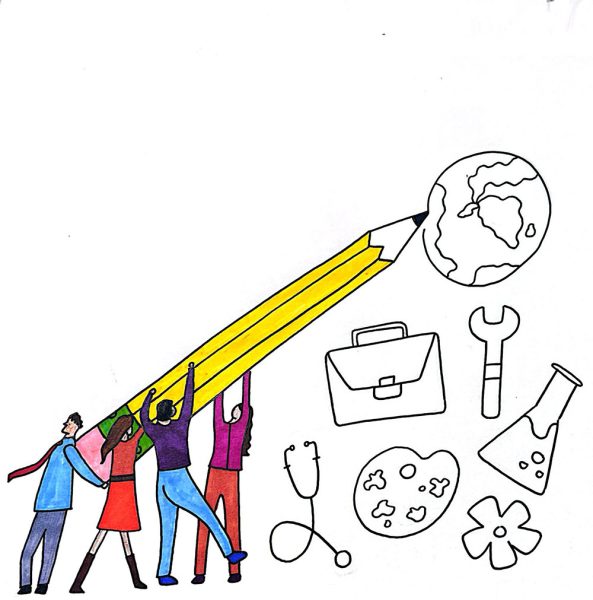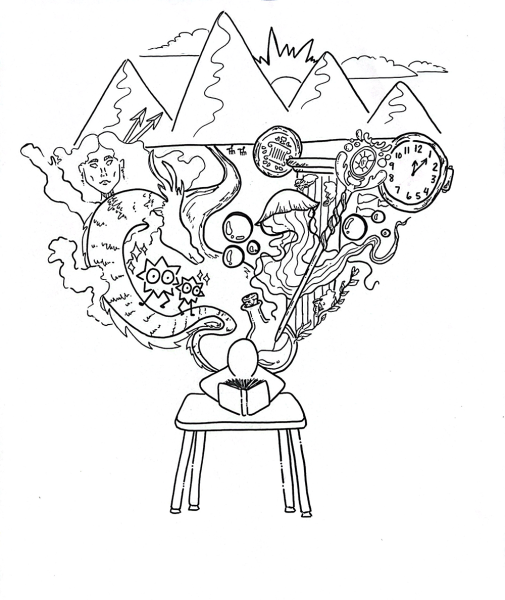New Leadership Considers Changes for NHS
New members take the NHS pledge at the induction ceremony in October.
English teacher Dr. Casey Matthews and physics teacher Michael Lerner have taken over the BHS National Honor Society this year.
Math teacher Lisa Morgan resigned from the position over the summer after advising the organization for almost a decade.
“Mrs. Morgan knew what she was doing, so we have some massive shoes that we are trying to fill post-COVID,” Matthews said. “Someone needed to step in, and Mr. Lerner and I work really well together.”
However, the pandemic had an impact on NHS, as it did on many clubs.
“The organization is not in a good place compared to where it was before the pandemic,” Lerner said. “We haven’t gotten it back to where it was before. Because of the last couple of years, we have to rebuild the club.”
Matthews and Lerner enjoy working together.
“It’s much easier to work with someone else,” Lerner added.
“Having two people be the advisers has definitely been good for both of us,” Matthews said.
In addition to rebuilding, they are trying to make some changes that both students and administrators are pushing for.
“Mr. Chase has told us that we need to make sure to change the application and the constitution, so that’s going to be a big goal no matter what,” Lerner said. “We also want to make NHS feel more like a student club.”
“We want the students to participate much more in running the club,” Matthews said. “We want to make the activities that we do more student-centered … and BHS-centered.”
Senior Amelie Cotta, a new NHS student this year, agrees that the application process needs to be changed.
“A lot of people don’t really like the teacher rating aspect [of the application process],” Cotta said, referring to the system where teachers score students from 1-10 for their character and leadership to determine their eligibility for NHS. “There needs to be an accurate way to see the students’ character and leadership.”
The advisers agree that the rating system will be removed in the future, although there are no certain plans on what the system replacing it will be.
“Based on the meetings so far, it seems like we are going to change the application process, which I look forward to,” Cotta says.
Some would like to change more than the application process.
“We hope to have more outreach with the community rather than just being something that students can brag about on college applications,” NHS President Hiba Ali said.
“Personally speaking, I hope to do more with the community,” she added. “We are supposed to represent character and leadership, all these things.”
Cotta brings up a concern about how the club is perceived.
“A lot of people believe they fail if they don’t get into NHS,” she said. “I think NHS is creating an environment that isn’t very positive. It’s become more of a bragging right than a society meant for helping the community.”
“We are supposed to be role models and we should embrace that,” Ali said… “It would be really meaningful if we could [add] things like organize donations and drives… One of our goals is to interact with the community and be more philanthropic.”
One change that has already been implemented is the way NHS tutoring is structured.
In the past, NHS tutors would choose an academy or study hall to attend, and would tutor any students who wanted help. This year tutors are assigned to a student or a few students whom they are responsible for working with. Tutors are each responsible for one subject, and students sign up for tutoring based on the subjects they need help with. The purpose is to maximize the effectiveness of the tutoring.
“The student is getting as much as they can out of the tutor because it’s a tutor who signed up to teach that subject, and the tutor is actually getting someone who wants to be tutored instead of an empty classroom,” Ali said. “Last year, the tutors would log onto a Google Meet, sit there for an hour, and log off. No one ever came for help.”
It’s unclear if the new system will be effective since it has not been fully put into place yet, but the goal is to ensure that NHS members have the opportunity to tutor and struggling students get the help they need.
Ali says there are still changes to be made.
“We haven’t voted on many changes yet, but we do plan to change the members’ obligations,” she said.
She says these votes will start taking place later this year. Though they aren’t sure what they want to change it to, they definitely want to add more meaning to the obligations, as opposed to just hitting a number. Ali hopes to move in the direction of more community-based volunteering.
Changing the club is not a smooth process. It’s hard to bring change to a society like NHS. Matthews and Lerner have to operate within constraints.
“We have to balance a lot of demands, Lerner said. “It is a national organization, so we have to follow what it means to be a National Honor Society chapter.”
Lerner explains that the students, the communities, and the administration all have different opinions on what NHS should be, and they have to make sure that all the changes need to reflect the wants of everyone.
Lerner explained that the challenge of balancing these demands is what makes it hard to make changes.
Lerner and Matthews hope to make positive changes, but they are also aware that what they do might not work, especially since they are new advisors.
“We are trying things, we feel like these things are worthy,” Matthews said. “We have no idea if they will fail or succeed.”
“We want to look at the constitution, we want student input, we want NHS to be inclusive, we want it to be an honor club, but an honor club that focuses on community and service,” she added. “We don’t know how successful we will be.”
Though there aren’t many concrete plans as of right now, Matthews and Lerner plan on trying to make improvements.
When talking about these changes, Lerner says, “I have no problem spectacularly failing as long as I learn from it.”
*The writer is a member of NHS.
Evelyn Zhang started writing for the Beachcomber in fall of 2020. She is interested in covering news. When not writing for the Beachcomber, Evelyn likes...



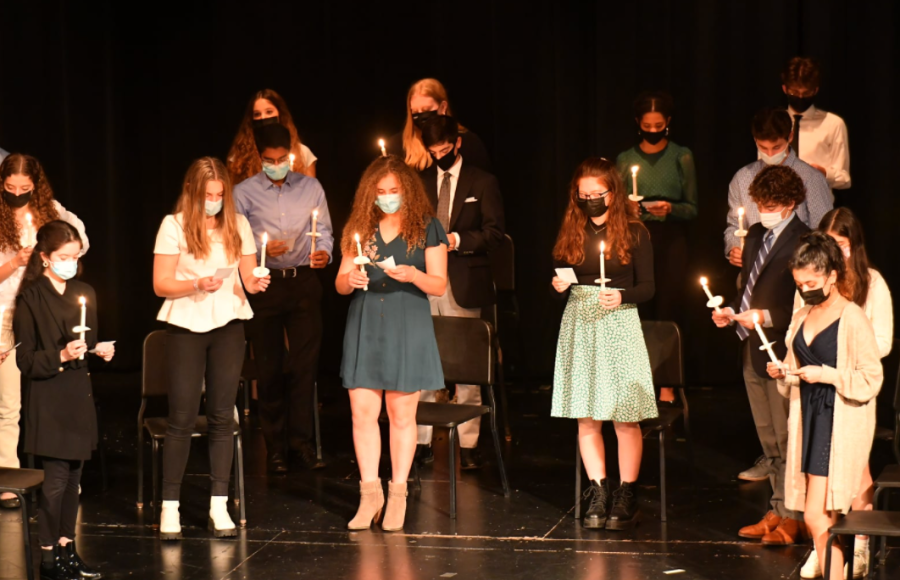
![“My parents have always said that education is important. My parents are Chinese immigrants, I'm Chinese American, [and that's a] value that has always been ingrained in our community,” said Senior Lyndia Zheng, pictured with Tony Zheng](https://bcomber.org/wp-content/uploads/2025/10/DSC_4244-600x400.jpg)


